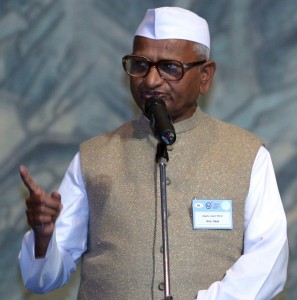Yesterday anti-corruption leaders in India called on citizens to turn off their lights in the evening to protest the detention of more than 1200 anti-corruption campaigners in New Delhi, The New York Times reported.
 The campaigners were detained following the arrest of well-known activist and Transparency International Integrity Award winner Anna Hazare early yesterday morning. Local police arrested Hazare at his home, according to the BBC after he vowed to go ahead with a hunger strike in a public park against corruption despite local police denying him a permit to hold the demonstration.
The campaigners were detained following the arrest of well-known activist and Transparency International Integrity Award winner Anna Hazare early yesterday morning. Local police arrested Hazare at his home, according to the BBC after he vowed to go ahead with a hunger strike in a public park against corruption despite local police denying him a permit to hold the demonstration.
The New York Times said that the likelihood of a showdown became evident when Hazare applied for a police permit to stage an indefinite fast. The police set 22 conditions for the protest to take place, six of which Mr Hazare refused to accept, including a three-day limit to the hunger strike and a cap of no more than 5000 protesters.
Transparency International India condemned the arrest of Hazare and other anti-corruption activists as unconstitutional and a violation of civil liberties.
“[The government] has not been able to check rising corruption in the country and is trying to muzzle the voice of those who raise their voice against corruption. This is undemocratic and [an] injustice to the people of this nation”
Anupama Jha, Transparency International India’s Executive Director in a statement
Leading up to the Lokpal Bill: Anna Hazare’s three-decade campaign against corruption in India
Hazare and his supporters have been calling for a law to establish an independent Ombudsman (Lokpal Bill) to tackle corruption, with the power to investigate any official, including the prime minister and judges.
Anna Hazare has been tackling government corruption in India for almost three decades. In 2003, Transparency International gave Hazare an Integrity Award for his efforts and spoke to him about his thoughts on how corruption can be overcome.
Public trust in the Indian government’s ability to tackle corruption is low after a series of recent corruption scandals, according to the article. TI’s own 2010 Global Corruption Barometer shows that 74 per cent of Indians think corruption has increased in last three years and that only 25 per cent think that their government’s efforts to fight corruption have been effective.
As discussions about the Lok Pal Bill heated up last month, our Chair, Huguette Labelle, recently gave an interview about the cost of corruption in India, and the importance of independent oversight bodies, see below:















 Connect with us on Facebook
Connect with us on Facebook Follow us on Twitter
Follow us on Twitter